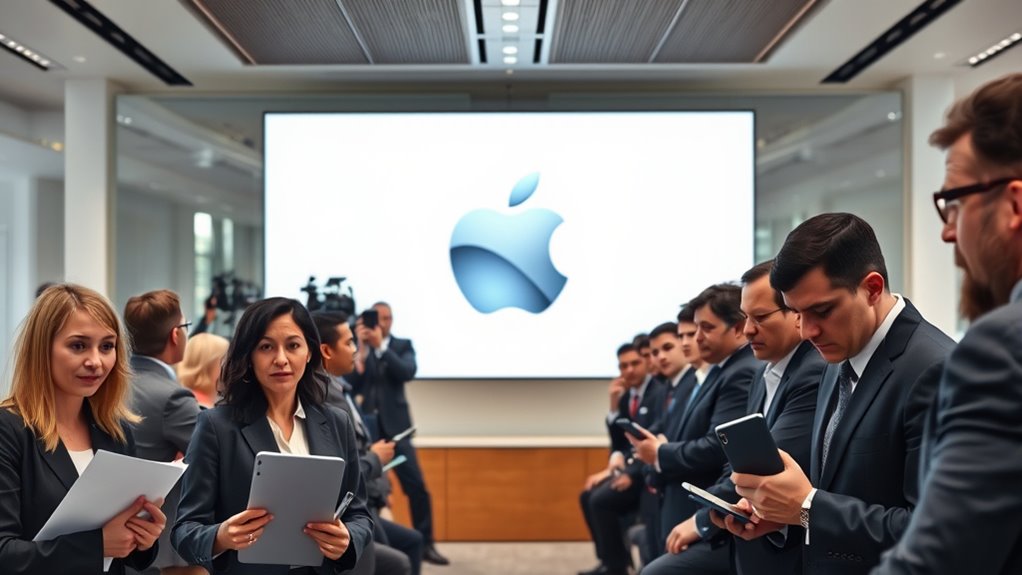Shareholders have sued Apple, accusing the company of overhyping its AI capabilities to manipulate investor perceptions and boost stock prices. They claim Apple exaggerated its AI advancements, creating an illusion of cutting-edge technology that may mislead investors and consumers alike. This lawsuit highlights concerns about corporate honesty and transparency in AI claims. If you want to understand how this case could impact Apple’s future disclosures and market trust, keep exploring further.
Key Takeaways
- Shareholders filed a lawsuit accusing Apple of exaggerating its AI capabilities to boost stock prices.
- The lawsuit claims Apple created an illusion of advanced AI technology through misleading marketing.
- Concerns focus on whether Apple’s AI claims are backed by genuine innovation and transparency.
- The legal action aims to hold Apple accountable for potentially false disclosures about its AI progress.
- The case may prompt Apple to improve transparency and honesty in its AI marketing and communications.

Shareholders have filed a lawsuit against Apple, accusing the company of overhyping its artificial intelligence capabilities to boost stock prices and public perception. The lawsuit alleges that Apple made exaggerated claims about its AI advancements, creating an illusion of cutting-edge technology to attract investors and consumers alike. As an investor, you might wonder whether Apple’s claims about AI are backed by real innovation or if they’re just marketing tactics. This situation highlights the importance of AI transparency—making sure that companies honestly communicate their technological progress, rather than overstating their accomplishments to manipulate market sentiment.
The issue of AI transparency is central here. When a major player like Apple touts its AI features, shareholders expect clear, truthful information about what these capabilities can actually do. If the company’s claims turn out to be inflated or misleading, it raises serious questions about the reliability of corporate disclosures. For you as an investor, this lack of transparency can lead to misinformed decisions, potentially resulting in financial losses once the truth surfaces. It’s a reminder that shareholder activism isn’t just about voting rights or shareholder meetings; it’s also about holding corporations accountable for honest communication about their technological progress.
In this case, shareholder activism takes the form of legal action, aiming to challenge Apple’s claims and demand greater accountability. Shareholders are pushing back against what they perceive as manipulation—using aggressive tactics like lawsuits to ensure the company is honest about its AI progress. This kind of activism can serve as a catalyst for improved corporate transparency, encouraging companies to be more forthcoming about their technological capabilities and limitations. It also signals to the broader market that investors are increasingly vigilant about the integrity of AI claims, especially from industry giants like Apple.
As someone invested in Apple or considering investing, you should pay close attention to how the company handles these allegations. Will Apple increase its AI transparency to restore trust? Or will it double down on its marketing narrative, risking further shareholder dissatisfaction? The outcome of this lawsuit could influence how companies communicate AI advancements in the future, emphasizing honesty over hype. Ultimately, this legal challenge underscores the need for companies to balance promotional efforts with truthful disclosures, ensuring shareholder activism continues to promote transparency and accountability in the rapidly evolving AI landscape. Understanding the importance of projector technology and accurate representations can serve as a metaphor for evaluating technological claims across industries.
Frequently Asked Questions
How Might This Lawsuit Impact Apple’s AI Development Plans?
This lawsuit could slow your AI development plans as Apple faces increased scrutiny. You might see a dip in market confidence and investor sentiment, which could lead to reduced funding or delays. Apple may need to focus more on transparency and proving its AI capabilities, potentially shifting resources away from innovation. Ultimately, the legal issues could create hurdles, impacting your company’s progress and reputation in the AI space.
Are There Previous Cases of Tech Overhyping AI Capabilities?
Yes, there have been previous cases where tech companies overhyped AI capabilities to boost marketing strategies. These actions often damage consumer trust when the actual AI performance doesn’t meet expectations. You should be cautious about such claims, as overhyping can lead to skepticism and regulatory scrutiny. Companies need to balance marketing with transparency to maintain credibility and ensure long-term consumer trust.
What Specific AI Features Are Shareholders Unhappy With?
You might think Apple’s AI features are groundbreaking, but shareholders see through the AI hype. They’re unhappy with claims about Siri’s smarter responses, advanced machine learning, and seamless integration that don’t quite deliver in real-world use. This gap between promise and reality fuels their concerns, making them question whether Apple’s AI ambitions are more style than substance. Ironically, the more Apple touts its AI, the more shareholders worry about overhyped capabilities.
Could This Lawsuit Influence Other Tech Companies’ AI Claims?
This lawsuit could definitely influence other tech companies’ AI claims, as it highlights the importance of tech accountability. When shareholders actively challenge overstated AI capabilities, it encourages companies to be more transparent and responsible. Your activism as a shareholder can pressure firms to set realistic expectations, fostering a culture of honesty and reducing the risk of overhyping, ultimately promoting better industry standards and increased trust among consumers.
How Is Apple Responding Publicly to These Allegations?
Apple responds publicly by emphasizing its commitment to innovation, transparency, and quality. They focus on maintaining investor confidence through clear communication, reassuring stakeholders that they stand behind their AI technology and development processes. By engaging in proactive public relations efforts, Apple aims to address concerns, reinforce trust, and demonstrate their dedication to advancing AI responsibly. This strategic approach helps bolster their reputation and stabilizes investor confidence amid the allegations.
Conclusion
You stand at the crossroads of innovation and deception, where Apple’s glowing promise of AI brilliance masks shadows of doubt. This lawsuit acts as a mirror, reflecting the fragile glass of trust shattered by overhyped claims. Just as a lighthouse warns ships of hidden reefs, this case reminds you to look beyond the dazzling lights and seek genuine substance beneath the surface. Trust, like a delicate seed, needs honest roots to flourish in the ever-evolving tech landscape.










